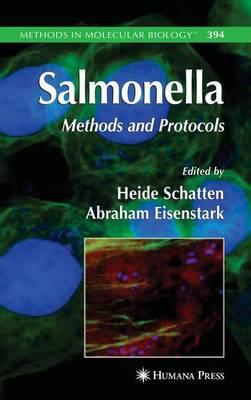Overview
Salmonella: Methods and Protocols presents detailed methods on a variety of aspects of Salmonella research, focusing on those which provide landmarks for future discovery. Highlighted topics include molecular genotyping, rapid and accurate new methods for sensitive determination of antibiotic resistance profiles, the characterization of Salmonella-specific cell antigens, and Salmonella-host cell interactions. Detailed methods for studying Salmonella motility are also presented. Each chapter provides a short overview of the topic, which is followed by detailed explanations of techniques such as genetic manipulation and molecular imaging that offer the possibilities of using Salmonella as a therapeutic vector to interfere with disease. This is the first comprehensive volume of methods and protocols for studying Salmonella and will be indispensable to researchers engaged in the study of Salmonella, and enterobacteria in general. Because no recent comprehensive literature of this format is available on Salmonella, Salmonella: Methods and Protocols will be of value to a wide variety of researchers engaged in the study of Salmonella, and enterobacteria in general.
Full Product Details
Author: Heide Schatten ,
Abe Eisenstark
Publisher: Humana Press Inc.
Imprint: Humana Press Inc.
Edition: Softcover reprint of hardcover 1st ed. 2007
Volume: 394
Dimensions:
Width: 15.20cm
, Height: 2.10cm
, Length: 22.90cm
Weight: 0.575kg
ISBN: 9781617376740
ISBN 10: 1617376744
Pages: 364
Publication Date: 19 November 2010
Audience:
Professional and scholarly
,
Professional & Vocational
Format: Paperback
Publisher's Status: Active
Availability: In Print

This item will be ordered in for you from one of our suppliers. Upon receipt, we will promptly dispatch it out to you. For in store availability, please contact us.
Reviews
From the reviews: This book presents detailed methods and protocols for the application of various analytical techniques to Salmonella research. It is aimed at geneticists, microbiologists, public health scientists, researchers and students. The book contains 17 chapters ... . (International Food Information Service, December, 2007) This is an interesting and very informative book that covers a broad range of methods in Salmonella research. Each chapter contains a useful introduction outlining in which field of research the methods are most likely to be useful. ... Clear diagrams and photographic illustrations enrich the written text material. This book is not simply a list of laboratory methods, but it is also a valuable guide that will allow bench scientists to choose the most appropriate methodological approach to solve specific research questions. (Pietro Mastroeni, Microbiology Today, May, 2008) The book provides quite a wide range of protocols from different fields of Salmonella research which in most cases can also be generalized for other members of the family Enterobacteriaceae. Each chapter provides a short overview of the topic which is followed by detailed protocol description. ... for those interested in entering an interesting field of Salmonella research I can recommend this book as a valuable source of a wide range of protocols enabling anybody to start from the very beginning. (I. Rychlik, Folia Microbiologia, Vol. 53 (3), 2008)
From the reviews: This book presents detailed methods and protocols for the application of various analytical techniques to Salmonella research. It is aimed at geneticists, microbiologists, public health scientists, researchers and students. The book contains 17 chapters ... . (International Food Information Service, December, 2007) This is an interesting and very informative book that covers a broad range of methods in Salmonella research. Each chapter contains a useful introduction outlining in which field of research the methods are most likely to be useful. ... Clear diagrams and photographic illustrations enrich the written text material. This book is not simply a list of laboratory methods, but it is also a valuable guide that will allow bench scientists to choose the most appropriate methodological approach to solve specific research questions. (Pietro Mastroeni, Microbiology Today, May, 2008) The book provides quite a wide range of protocols from different fields of Salmonella research which in most cases can also be generalized for other members of the family Enterobacteriaceae. Each chapter provides a short overview of the topic which is followed by detailed protocol description. ... for those interested in entering an interesting field of Salmonella research I can recommend this book as a valuable source of a wide range of protocols enabling anybody to start from the very beginning. (I. Rychlik, Folia Microbiologia, Vol. 53 (3), 2008)
From the reviews: This book presents detailed methods and protocols for the application of various analytical techniques to Salmonella research. It is aimed at geneticists, microbiologists, public health scientists, researchers and students. The book contains 17 chapters ! . (International Food Information Service, December, 2007) This is an interesting and very informative book that covers a broad range of methods in Salmonella research. Each chapter contains a useful introduction outlining in which field of research the methods are most likely to be useful. ! Clear diagrams and photographic illustrations enrich the written text material. This book is not simply a list of laboratory methods, but it is also a valuable guide that will allow bench scientists to choose the most appropriate methodological approach to solve specific research questions. (Pietro Mastroeni, Microbiology Today, May, 2008) The book provides quite a wide range of protocols from different fields of Salmonella research which in most cases can also be generalized for other members of the family Enterobacteriaceae. Each chapter provides a short overview of the topic which is followed by detailed protocol description. ! for those interested in entering an interesting field of Salmonella research I can recommend this book as a valuable source of a wide range of protocols enabling anybody to start from the very beginning. (I. Rychlik, Folia Microbiologia, Vol. 53 (3), 2008)




